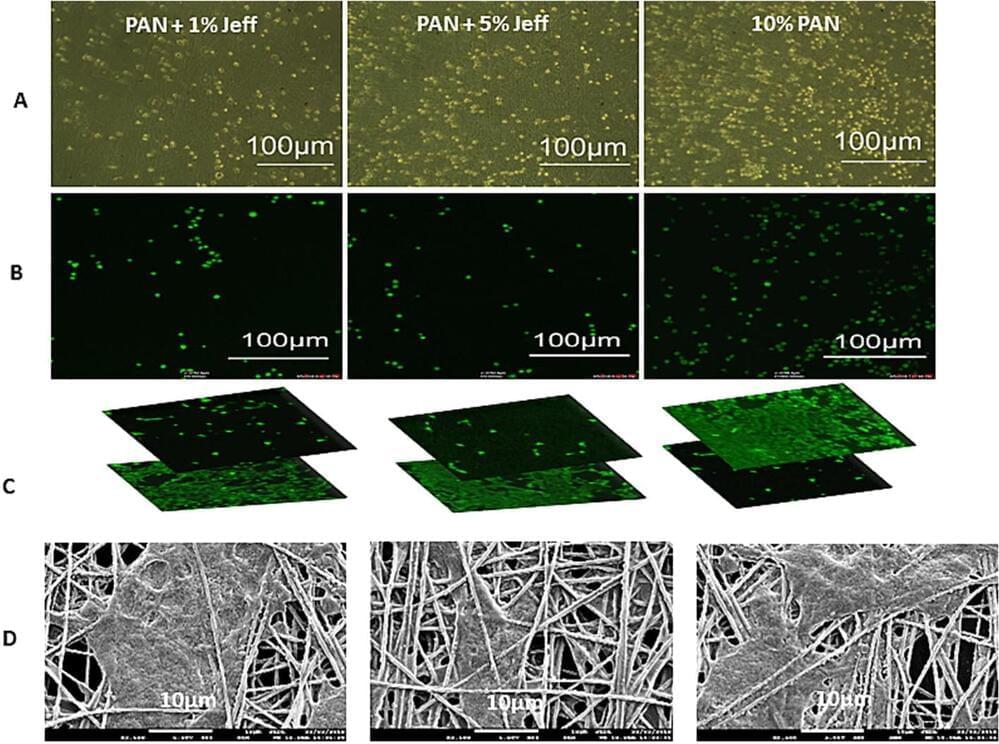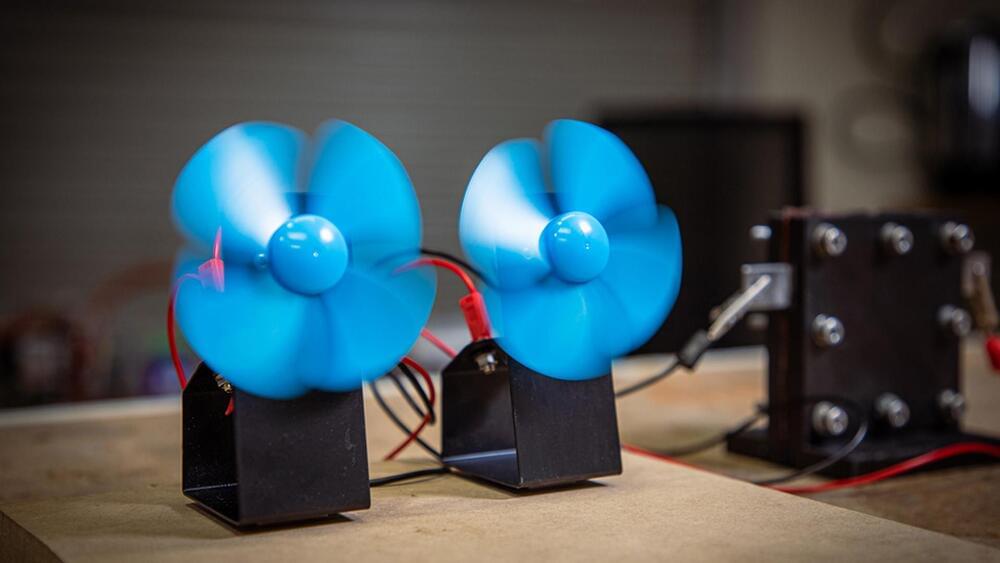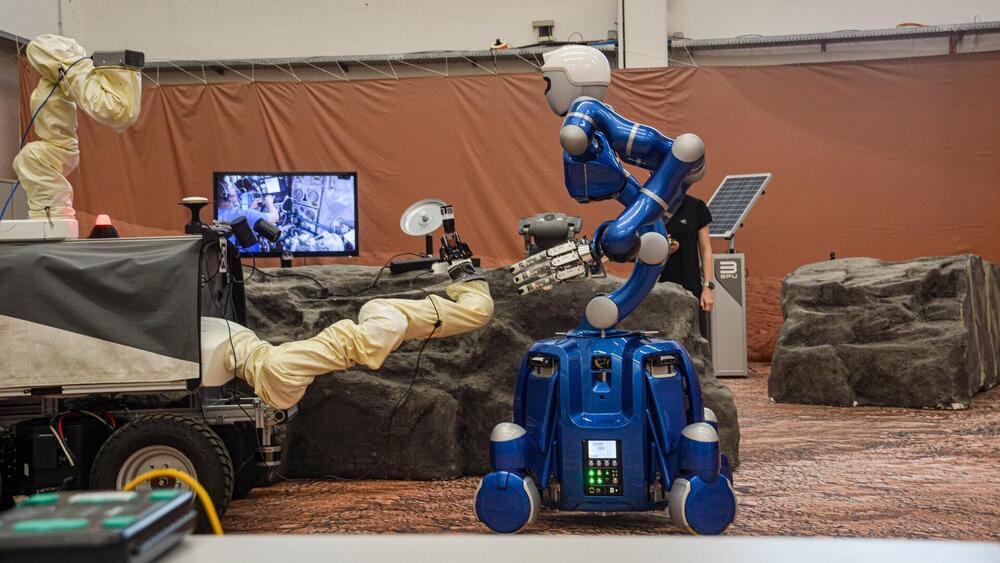Get the latest international news and world events from around the world.

Retina cells cultured on nanofiber scaffolds could help treat blindness
Scientists have found a way to use nanotechnology to create a 3D “scaffold” to grow cells from the retina—paving the way for potential new ways of treating a common cause of blindness.
Researchers, led by Professor Barbara Pierscionek from Anglia Ruskin University (ARU), have been working on a way to successfully grow retinal pigment epithelial (RPE) cells that stay healthy and viable for up to 150 days. RPE cells sit just outside the neural part of the retina, and when damaged, can cause vision to deteriorate. Their work is published in Materials & Design.
It is the first time this technology, called “electrospinning,” has been used to create a scaffold on which the RPE cells could grow, and could revolutionize treatment for one of age-related macular degeneration, one of the world’s most common vision complaints.
A Starship space station? NASA wants a modified SpaceX Mars rocket to orbit Earth
The Starship upper stage’s impressive 29.5-foot diameter means it could fit up to 100 passengers at a time.
SpaceX’s Starship rocket program is the culmination of founder Elon Musk’s original plan of sending humans to Mars and making humans an interplanetary species.
And yet, Musk has always championed the launch system, originally called the Interplanetary Transport System, as a versatile spacecraft that could be used as a rapid point-to-point transportation system for Earth — a modified version of Starship has also been contracted by NASA for the Artemis III Moon landings, expected to take place in 2025.

Hubble Sees Evaporating Planet Getting the Hiccups
A youthful planet has been exhibiting unpredictable alterations in its atmosphere during each revolution around its parent star.
A young planet, situated approximately 32 light-years from Earth, has been exhibiting dynamic changes in its atmosphere during each revolution around its parent star. The Hubble Space Telescope made this fascinating discovery as it observed the planet orbiting AU Microscopii (AU Mic), a remarkably active red dwarf star.
During one of Hubble’s initial observations, it was noted that the planet appeared to be retaining its atmosphere steadily. However, there was a twist to this finding. Approximately a year and a half later, Hubble’s follow-up observations brought to… More.
A young planet whirling around a petulant red dwarf star is changing in unpredictable ways orbit-by-orbit.

Eco-friendly proton battery offers affordable energy storage
RMIT University’s new proton battery could revolutionize energy storage, offering a safe, affordable, eco-friendly alternative to lithium-ion batteries.
The latest ‘proton battery’ developed by RMIT University holds the potential to revolutionize power supply for homes, vehicles, and devices without the disposal-related environmental challenges posed by lithium-ion batteries.
The battery works by using a carbon electrode to store hydrogen that has been separated from water, functioning like a hydrogen fuel cell to generate electricity.

NASA astronaut controls Earth robots while flying 17,150 mph aboard ISS
The test is part of NASA and ESA’s future plans for controlling robots on the Moon’s surface from the lunar Gateway station.
NASA astronaut Frank Rubio recently controlled a small team of robots on Earth while flying aboard the International Space Station (ISS), a blog post from the European Space Agency (ESA) reveals.
The test was carried out in order to demonstrate and investigate the capacity for using remote-controlled robots for future lunar exploration.

Scientists invent accurate AI-powered heat vision for driving at night
The technology can also be used in fog and smoke, aiding firefighters.
This is according to a report by PopSci published on Wednesday.
Researchers at Purdue University and Los Alamos National Laboratory have joined forces to engineer something they call “heat-assisted detection and ranging,” or HADAR, which consists of a completely new camera imaging system based on AI interpretations of heat signatures. The technology could soon allow vehicles and robots to see at night time.
A once muddy, unclear tech
We have all seen movies where agents use thermal imaging to see their surroundings in the dark, but in reality, this technology is far from practical because thermal radiation particles diffuse into their nearby environments. This means that trying to image them becomes a complicated, muddy, and unclear process.



Destination Psyche: NASA Spacecraft Prepares for Epic 2.5-Billion-Mile Voyage
Engineers and technicians at Cape Canaveral are preparing the Psyche spacecraft for liftoff, which is slated for October 5.
With less than 100 days remaining before its October 5 launch, NASA’s Psyche spacecraft is undergoing final preparations at Cape Canaveral, Florida. Teams of engineers and technicians are working diligently, essentially around the clock, to ensure the orbiter is ready to journey 2.5 billion miles (4 billion kilometers) to a metal-rich asteroid that may tell us more about planetary cores and how planets form.
The mission team recently completed a comprehensive test campaign of the flight software and installed it on the spacecraft, clearing the hurdle that kept Psyche from making its original 2022 launch date.